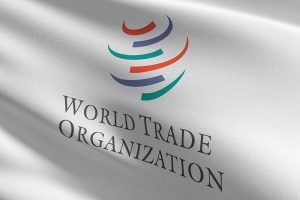 The World Trade Organization (WTO) held its 12th Ministerial Conference last week in Geneva after thrice postponing the gathering due to the COVID-19 pandemic.
The World Trade Organization (WTO) held its 12th Ministerial Conference last week in Geneva after thrice postponing the gathering due to the COVID-19 pandemic.
By the end of the six-day conference, trade ministers from 164 countries had agreed to start discussing reform of the organization and had dealt with intellectual property protection for COVID-19 vaccines, fishing subsidies, food security and digital trade.
The ministerial was originally planned to take place in Kazakhstan in 2020, but as the pandemic persisted, WTO leaders eventually decided that Kazakhstan would co-host and chair the ministerial in Geneva, where the WTO is based. The WTO is the only global organization dealing with the rules of trade between nations.
The ministerial typically is held every two years, but as of this month it had been almost five years since the group had met. The meeting was expected to be held from June 12–15, but was extended by two additional days, to June 17, with the goal of allowing members to find convergence on various issues with the additional time.
This was the first WTO ministerial led by Director General Ngozi Okonjo-Iweala of Nigeria. Director General Okonjo-Iweala, who took the helm of the WTO in February 2021, is the first woman and first African to lead the organization. Her renewable term will expire on August 31, 2025.
U.S. Trade Representative Katherine Tai attended the ministerial along with the U.S. Ambassador to the WTO, Maria Pagan.
While in Geneva, Tai held bilateral meetings with trade ministers from India, the United Kingdom, and Kenya, among others. Notably missing from the list of meetings was China.
In a pre-taped statement posted on the WTO website, Tai remarked, “It is our responsibility to prove to our citizens that global engagement and diplomacy can produce real results that improve their lives and address their day-to-day needs.”
Tai also called for an expansive WTO agenda, specifically calling for the WTO to address workers’ rights.
At the end of the 12th ministerial, U.S. trade officials voiced optimism about the outcome. Pagan stated that she was “proud of the things that did not happen,” calling unrealized concerns equally as important as completed agreements.
There had been concerns that negotiations might collapse, and members walk away from the ministerial without any results, as has happened in the past. But there were no major setbacks and the 12th ministerial resulted in the achievements outlined below.
WTO Reform
At the ministerial, WTO members agreed to formally launch a broad-based discussion on reform of the 27-year-old organization to address longstanding concerns, including reform to the dispute settlement system. The United States has said the Appellate Body judges have made decisions beyond the panel’s authority.
Pagan commented that the United States is happy with the final language on starting the reform process, which allows for loose, unstructured discussions with ideas coming from all over.
The ministerial outcome document commits members to working toward reforms of the organization to improve all its functions through “an open, transparent and inclusive process.”
The WTO’s General Council and subsidiary bodies will conduct the work, review progress, and consider decisions on reform that will be submitted to the 13th Ministerial Conference.
Digital Trade
On the third day of the ministerial, talks were at a near-standstill as some nations opposed renewing a 24-year-old moratorium on imposing tariffs on digital goods and services. Failing to renew the moratorium could sharply increase the cost of doing business on the internet and would represent a significant setback from the WTO and its role in promoting free and open markets.
The moratorium was extended, however, allowing businesses to continue to benefit from the free international flow of online goods and services in a time of global economic uncertainty.
Fisheries
A partial deal on curbing harmful fishing subsidies was reached after 20 years of negotiations. The agreement addresses rules that prohibit subsidies for illegal, unreported, and unregulated fishing, but left other areas unresolved.
Vaccines
The WTO reached a new pact that will allow developing countries to authorize generic production of COVID-19 vaccines without the patent holder’s permission.
Pagan noted that many industry groups disliked the new pact as it weakens intellectual property rights. The U.S. Chamber described the new pact as “a solution in search of a problem,” given that a record number of vaccines have been distributed around the world in record time.
Food Security
Considering the food security problems facing many areas, WTO members approved statements aimed at discouraging countries from imposing food export restrictions, particularly for foodstuffs purchased by the United Nations World Food Program for humanitarian purposes.
13th Ministerial Conference
Staying on the previous pre-pandemic timeline, the 13th Ministerial Conference should be held by the end of December 2023. Cameroon and the United Arab Emirates have both proposed to host the gathering.
The main function of the WTO is to ensure that trade flows as smoothly, predictably and freely as possible. At its heart are the WTO agreements, negotiated and signed by the bulk of the world’s trading nations, and ratified or approved in their parliaments or legislatures. The goal is to help producers of goods and services, exporters and importers conduct business.
The basic aim of the WTO is to liberalize world trade and place it on a secure foundation, thereby contributing to economic growth and development, and to the welfare of people around the world. Based on the original General Agreement on Tariffs and Trade (GATT) created in 1948 to expand economic activity by reducing tariffs and other barriers to trade, the WTO is a multilateral treaty subscribed to by 164 governments, which together account for the majority of world trade (with more than 20 nations negotiating their accession).
CalChamber Position
The California Chamber of Commerce is hopeful the major trading economies will come to a consensus on a reform of the WTO. The revamp should address the functioning of the Appellate Body, encourage greater transparency and enhance discipline for members who fall behind on their reporting obligations.
The CalChamber, in keeping with longstanding policy, enthusiastically supports free trade worldwide, expansion of international trade and investment, fair and equitable market access for California products abroad and elimination of disincentives that impede the international competitiveness of California business.
The WTO is having a positive impact on how California producers of goods and services compete in overseas markets, as well as domestically, and is creating jobs and economic growth through expanded international trade and investment.
The WTO gives businesses improved access to foreign markets and better rules to ensure that competition with foreign businesses is conducted fairly.


